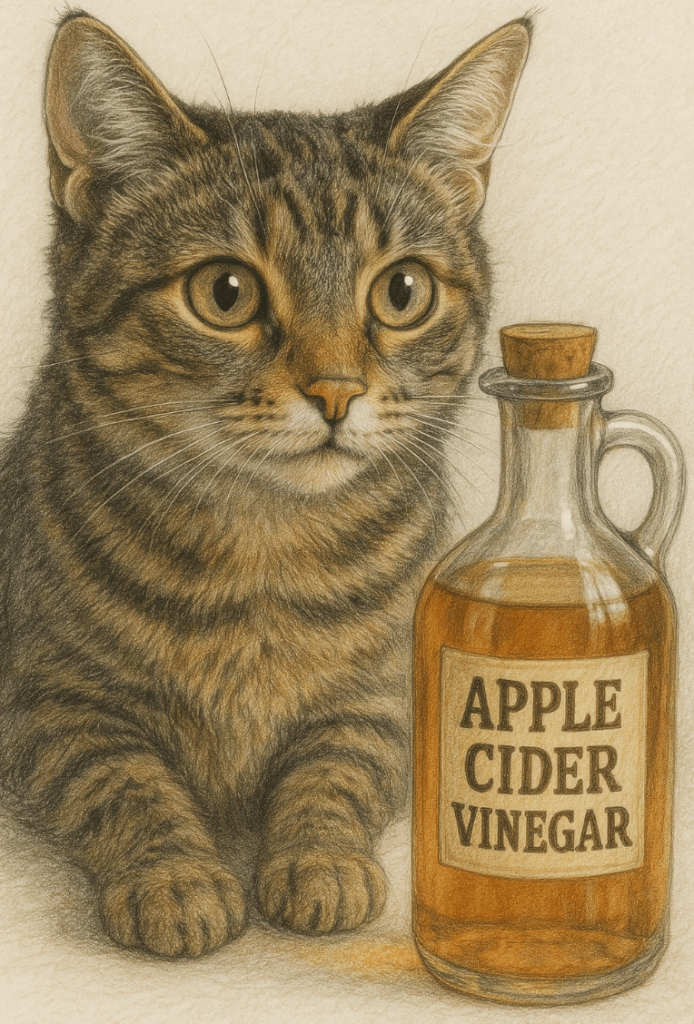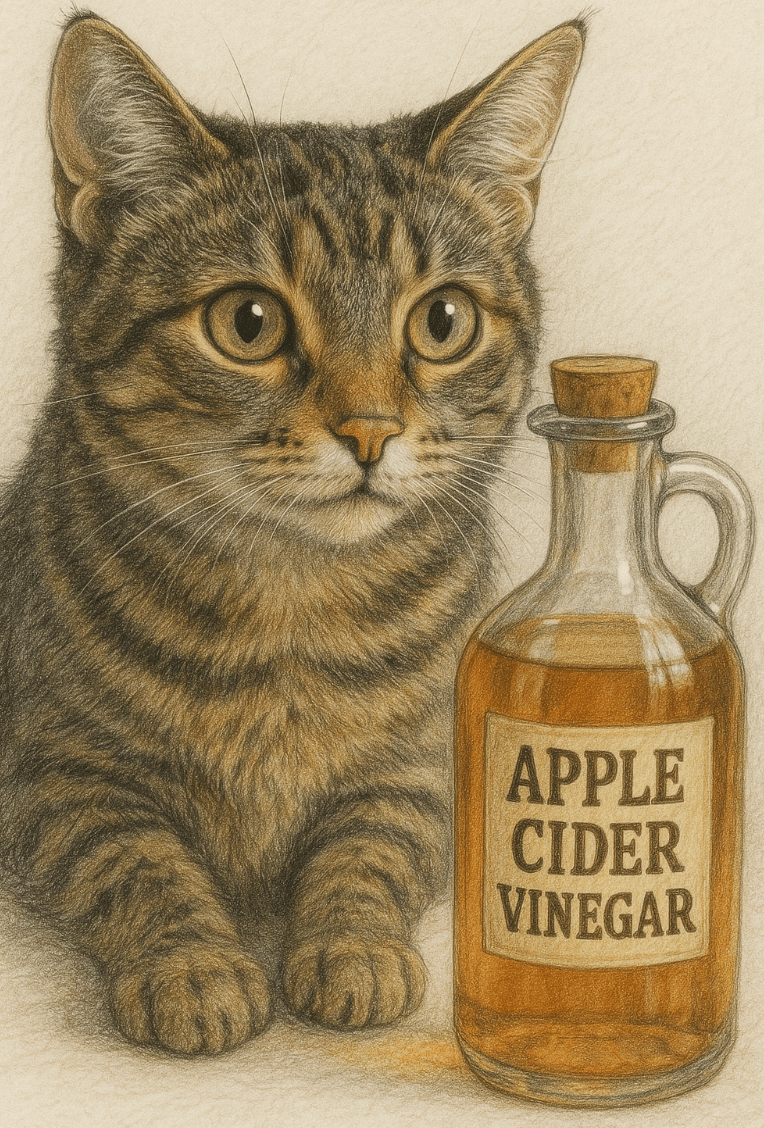Can Cats Eat Apple Cider Vinegar?
Apple cider vinegar (ACV) has gained popularity as a natural remedy for humans and pets alike, thanks to its potential health benefits. However, when it comes to cats, pet owners must proceed with caution. While ACV may offer some advantages, it’s crucial to understand whether it’s safe for feline consumption and how it might affect their delicate systems. Cats have unique dietary needs, and introducing new substances—even those considered “natural”—requires careful consideration. In this blog post, we’ll explore the topic of apple cider vinegar for cats, including its potential benefits, risks, and guidelines for safe use.
Potential Benefits of Apple Cider Vinegar for Cats
When used correctly and in moderation, apple cider vinegar may provide certain health benefits for cats. Here are some of the ways it could support your feline friend’s well-being.
Supports Digestive Health:
ACV contains probiotics and enzymes that may help balance gut flora, potentially aiding digestion and reducing symptoms of gastrointestinal upset.Repels Fleas and Ticks:
Diluted ACV can be used as a topical spray to repel fleas and ticks, offering a natural alternative to chemical treatments.Promotes Urinary Tract Health:
Some cat owners report that ACV helps reduce the risk of urinary tract infections by balancing pH levels in the body.Boosts Immune Function:
The antioxidants and acetic acid in ACV may strengthen the immune system, helping your cat fight off illnesses.Improves Coat Condition:
When added to bathwater or applied topically, diluted ACV can leave your cat’s coat shiny and free of dandruff.
While these benefits are promising, they should not replace veterinary care, especially for chronic conditions. Always consult your vet before introducing ACV into your cat’s routine.
Risks of Feeding Apple Cider Vinegar to Cats
Despite its potential benefits, apple cider vinegar poses certain risks if not used properly. Understanding these dangers ensures your cat’s safety and well-being.
Acidic Nature Can Irritate Stomach Lining:
The high acidity of ACV can upset your cat’s stomach, leading to vomiting, diarrhea, or discomfort.Tooth Enamel Damage:
Exposure to undiluted ACV can erode tooth enamel, increasing the risk of dental issues over time.Electrolyte Imbalance:
Overuse of ACV may disrupt your cat’s electrolyte balance, particularly potassium levels, which can harm kidney function.Allergic Reactions or Sensitivity:
Some cats may experience allergic reactions or skin irritation when ACV is applied topically or ingested.Interference with Medications:
ACV can interact with certain medications, such as those for diabetes or heart conditions, making it unsafe for cats on prescription treatments.
These risks highlight the importance of using ACV sparingly and only under veterinary guidance.
Check this guide 👉Can Cats Eat Capers? Best 7 Expert Tips!
Check this guide 👉Can Cats Eat Alfalfa Sprouts? Best 7 Expert Tips!
Check this guide 👉Can Cats Eat Coleslaw? Best 7 Expert Tips!

Safe Uses of Apple Cider Vinegar for Cats | Unsafe Practices to Avoid |
|---|---|
Diluted ACV in water for digestive support | Feeding undiluted ACV directly |
Topical flea repellent spray (heavily diluted) | Using ACV without consulting a vet |
Bath rinse for coat conditioning | Applying ACV near eyes, ears, or nose |
Urinary health maintenance (in moderation) | Giving ACV to cats with kidney issues |
Natural cleaning solution for pet areas | Overusing ACV as a supplement |
How to Safely Introduce Apple Cider Vinegar to Your Cat
If you decide to incorporate apple cider vinegar into your cat’s routine, it’s essential to do so safely and responsibly. Follow these steps to minimize risks and maximize benefits.
Dilute Properly:
Mix one teaspoon of ACV with one cup of water to create a safe dilution for internal or external use.Start Small:
Begin with minimal amounts to observe how your cat reacts, gradually increasing only if no adverse effects occur.Monitor for Side Effects:
Watch for signs of discomfort, such as vomiting, diarrhea, or excessive scratching, and discontinue use if symptoms appear.Use Only Raw, Unfiltered ACV:
Choose organic, raw, unfiltered apple cider vinegar with the “mother” for maximum quality and effectiveness.Consult Your Veterinarian First:
Always seek professional advice before introducing any new substance into your cat’s diet or grooming routine.
By following these precautions, you can ensure your cat remains healthy and comfortable while benefiting from ACV.
Signs Your Cat May Be Sensitive to Apple Cider Vinegar
Even with careful use, some cats may exhibit sensitivity or adverse reactions to apple cider vinegar. Recognizing these signs allows you to act quickly and prevent further complications.
Gastrointestinal Upset:
Symptoms like vomiting, diarrhea, or loss of appetite may indicate digestive distress caused by ACV.Skin Irritation:
Redness, itching, or swelling after topical application suggests an allergic reaction or irritation.Excessive Drooling:
Cats may drool excessively if they ingest undiluted ACV or if it irritates their mouth or throat.Behavioral Changes:
Lethargy, aggression, or avoidance behaviors could signal discomfort or pain related to ACV exposure.Breathing Difficulties:
Wheezing or labored breathing may occur if ACV is accidentally inhaled or causes an allergic response.
If you notice any of these signs, stop using ACV immediately and contact your veterinarian for guidance.
Common Misconceptions About Apple Cider Vinegar for Cats
There are several misconceptions about using apple cider vinegar with cats. Clarifying these myths helps set realistic expectations and ensures safe usage.
Myth: ACV Is a Cure-All Remedy:
While it has potential benefits, ACV is not a magical cure for all feline health issues and should complement—not replace—proper veterinary care.Myth: Undiluted ACV Is Safe for Cats:
Undiluted ACV is highly acidic and can harm your cat’s digestive system, teeth, and skin. Always dilute it before use.Myth: All Cats Benefit from ACV:
Not every cat will benefit from ACV, and some may experience adverse reactions. Individual tolerance varies widely.Myth: ACV Prevents All Parasites:
While it may repel fleas and ticks, it’s not foolproof and shouldn’t replace regular parasite prevention methods.Myth: ACV Can Replace Water Additives:
ACV should never replace prescribed water additives or medications without veterinary approval.
Understanding these misconceptions prevents misuse and promotes responsible care.
Alternative Remedies for Common Cat Health Issues
If you’re hesitant about using apple cider vinegar, there are other natural remedies and solutions that may address similar concerns.
Probiotics for Digestive Health:
Probiotic supplements designed for cats can improve gut health without the risks associated with ACV.Essential Oils for Flea Control:
Certain pet-safe essential oils, like lavender or cedarwood, can deter fleas when used correctly.Hydration for Urinary Health:
Encouraging increased water intake through wet food or cat water fountains supports urinary tract health naturally.Oatmeal Baths for Skin Conditions:
Oatmeal-based shampoos or rinses soothe irritated skin without the acidity of ACV.Regular Grooming for Coat Care:
Brushing and bathing with cat-friendly products keep coats shiny and healthy without relying on ACV.
These alternatives provide safe options for addressing common feline health concerns.
Tips for Enhancing Your Cat’s Overall Well-Being
In addition to considering remedies like apple cider vinegar, focusing on holistic care ensures your cat leads a happy and healthy life.
Provide a Balanced Diet:
Feed high-quality, species-appropriate food to meet your cat’s nutritional needs and support overall health.Encourage Play and Exercise:
Regular playtime keeps your cat physically active and mentally stimulated, reducing stress and boredom.Schedule Routine Vet Visits:
Annual check-ups help detect and address potential health issues early, ensuring long-term wellness.Maintain a Clean Environment:
Keep your home free of toxins, allergens, and hazards to create a safe space for your cat.Strengthen Your Bond Through Interaction:
Spend quality time grooming, playing, and cuddling with your cat to build trust and companionship.
Holistic care goes beyond remedies, fostering a nurturing environment where your cat can thrive.
Frequently Asked Questions About Cats and Apple Cider Vinegar
Can I give my cat apple cider vinegar every day?
No, daily use is not recommended due to the risk of side effects; occasional use under vet supervision is safer.
How much apple cider vinegar can I give my cat?
A diluted mixture of 1 teaspoon ACV per cup of water is generally considered safe, but always confirm with your vet.
Is apple cider vinegar safe for kittens?
Kittens have more sensitive systems, so it’s best to avoid ACV entirely unless specifically advised by a veterinarian.
Can apple cider vinegar cure urinary tract infections in cats?
While it may help maintain urinary health, it’s not a substitute for veterinary treatment of UTIs.
What should I do if my cat accidentally drinks undiluted ACV?
Contact your veterinarian immediately, as undiluted ACV can cause serious harm to your cat’s digestive and urinary systems.
Proceeding Safely with Apple Cider Vinegar for Cats
Apple cider vinegar can offer some benefits for cats, but its use must be approached with caution and responsibility. By understanding the potential risks and adhering to safe practices, you can determine whether ACV is appropriate for your feline companion. Always prioritize your cat’s health and consult your veterinarian before introducing any new substances into their routine. With proper care and attention, you can ensure your cat stays happy, healthy, and thriving.
Do Cats Have Taste Buds? Best 7 Expert Tips! – Discover how cats experience flavors and why their taste is so unique.
Do Dogs Have Taste Buds? Best 7 Expert Tips! – Discover how dogs experience taste, their preferences, and what it means for their diet and health.
Can Cats Taste Sweet? Best 7 Expert Tips! – Discover why cats can’t taste sweetness, how it affects their diet, and tips to keep them healthy and happy.
Can Dogs Taste Sweet? Best 7 Expert Tips! – Discover how dogs perceive sweetness, which foods are safe, and tips to manage their sweet cravings responsibly.





